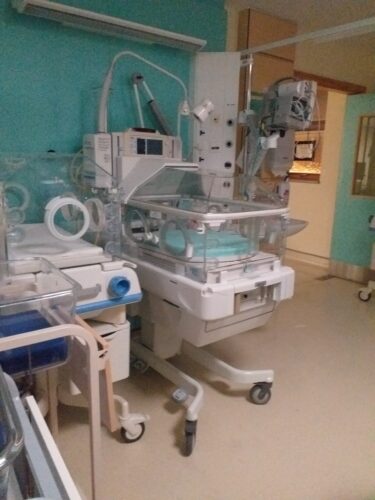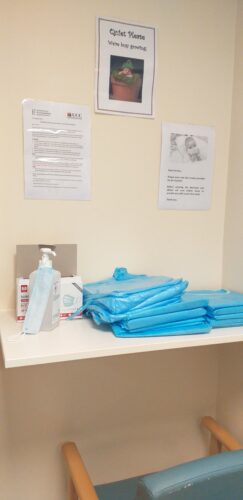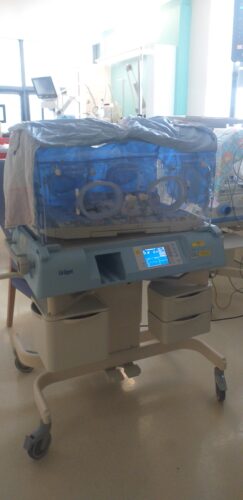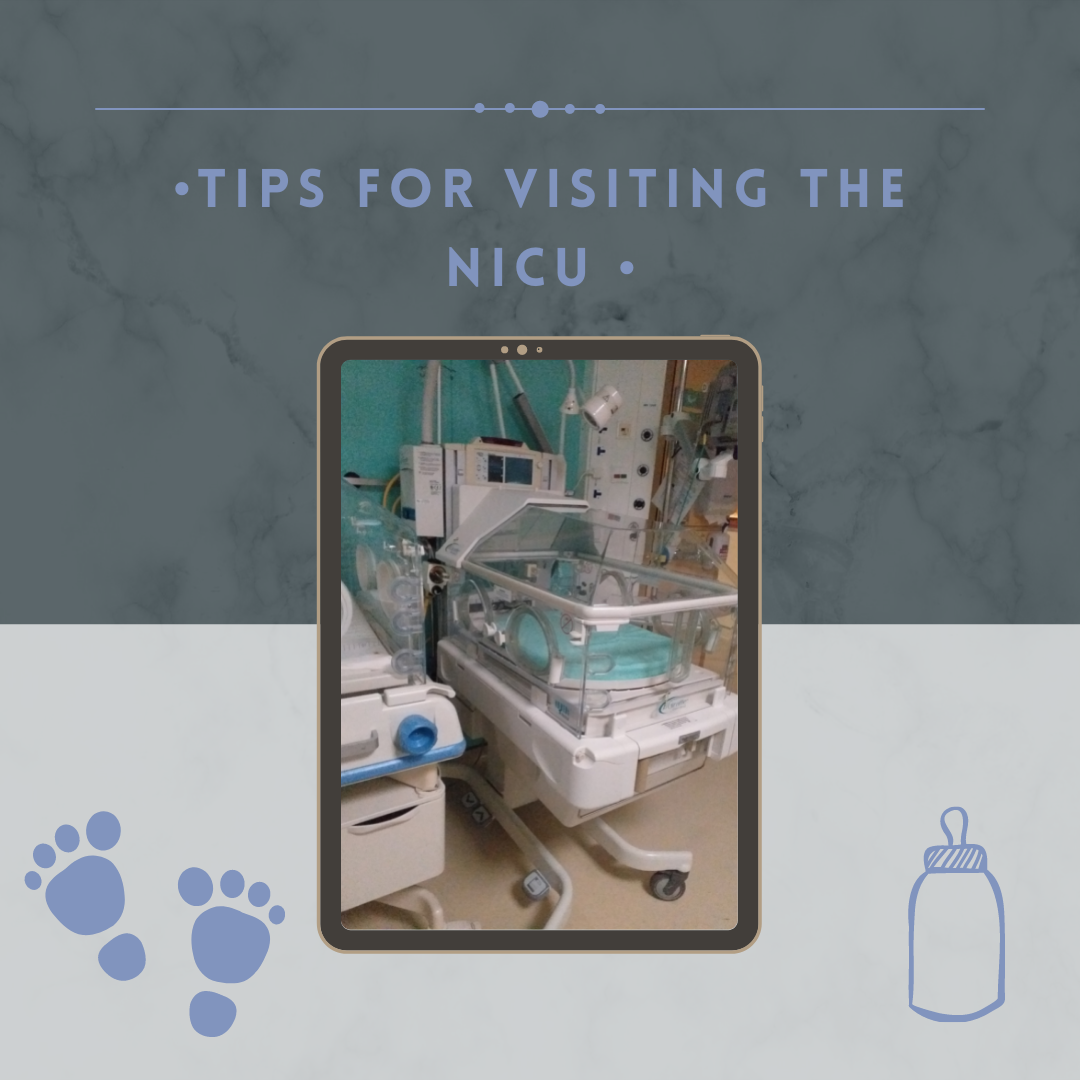Nobody knows how to act or behave when they visit the NICU for the first time and that’s totally understandable given the fact that most never have to! It’s quite an exclusive club to be a part of and one I truly wouldn’t wish upon anyone. So here are some tips for visiting the NICU that I’ve compiled, based on my own personal experience.

Bring Water
The NICU is kept at a lovely 26 degress to keep the babies nice and warm. However, when you’re sat in layers of PPE on top of layers of clothing and wearing a dry mask, things can get a bit sweaty. Staying hydrated is key if you are breastfeeding but your partner will also need some water to keep them going.
During Covid we were allowed to visit for 1 to 2 hours (ish) per day, so taking a bottle of water to keep us cool was a must.
Wear Loose Clothing
As mentioned above and something I discovered quickly during my first visit to the NICU, wearing loose, cool clothing has to be done. Those blue gowns are basically your own personal and wearable sauna when exposed to the NICU heat.

Have Tissues Handy
The NICU can be a really emotional place. Not just when you first start visiting your baby in there, either. It’s a rollercoaster of ups and downs and tissues can be a God send to stop yourself drowning in your mask from the tears.
Bring Your Partner First Time – If Allowed
Seeing your premature baby for the first time, especially if they are born at a much earlier gestation, can be completely overwhelming. Having your partner there to hold your hand and help you digest the information you are being given (critically if you are still heavily sedated) is really helpful.
Take A Compact Mirror
Arthur was so tiny for a long time during his NICU stay. When I was able to start holding him and start Kangaroo Care, he was so small I couldn’t see his face at all. Bringing a small, compact mirror meant that I was able to place it on the side and watch what he was doing without disturbing him.
Remember Your Milk
If you’re expressing for your premature baby, you’ll need to bring along the milk you’ve refrigerated that day. I used to take mine in a thermal lunchbox with an icepack, clearly labelled with the date and time, ready to be popped in the fridge/ freezer for Arthur to have when needed.
The hospital supplied me with bottles and labels for the entirety of Arthur’s stay in the NICU, which was really helpful.
Bring a shirt for Kangaroo Care
If you’re baby isn’t too tired, you may be able to start doing Kangaroo Care at the beginning when they are super small, in order to bond with them and aid their growth.
As you won’t know if they’re capable of it until you arrive, I found it best to bring along a clean shirt every time I visited. This way, if he was able, I was ready to go and would just nip to the toilet to change.
A man’s shirt is easy to open up and place the baby on your chest for skin to skin, and again easy to do up without putting to much pressure on the baby during the hold. I’d also choose a cool, loose shirt, as the minimum time your baby should be out for Kangaroo Care is 2 hours and you will get hot.
Stay Calm, Focus On Your Baby
It can be so hard to focus on just your child when the machines are beeping, or other parents are chatting to nurses, Doctors are doing rounds or alarms are going off. But this is one of the most important tips for visiting the NICU I can arm you with.
At the start the sights, smells, activity and sounds can be SO overwhelming, but you will learn as time goes on to zone them out and just focus on the limited time you have with your baby. They need you to be present as much as you want them to be home. Try not to freak out when a baby is brought in or something scary happens – just focus in on your baby.
More Tips For Visiting The NICU
Take A Notebook
From start to finish, there will be things you are told that you’ll want and need to remember. The NICU is such an overwhelming place, that you’d be forgiven for forgetting most if not everything.
I found that keeping a notebook meant, if I was visiting alone, I’d be able to recall this important information later for my partner. It was also really useful for jotting down questions that arose, and keeping a log of what was happening, like weight gain and key moments.
Remember The Washing!
Your child might not be ready to wear clothes for some time due to their size. It took Arthur around 6 weeks to get into an outfit and even then, tiny baby size swamped him.
But, when they are ready, they will need 1 if not 2 clean outfits to wear each day. An outfit would include a vest, a babygro with feeties and mittens (most have these built in now), and a hat.
You wont need to worry about this so much at the start, as there are a lovely group of women who I called ‘The Knitting Nanas’, who specifically knit and donate tiny hats and blankets for babies who are so small you couldn’t buy them these anywhere, if you wanted to.
If you’re struggling at the start, the hospital may have a spare babygro and vest that other parents have donated until you get sorted with their wardrobe.
Bring Something Clean To Place In The Incubator
As I mentioned in a previous post on expressing for your premature baby, placing something clean in the incubator, like a muslin or a small blanket can be great for getting your baby’s scent onto it. Then you can take it home to sniff whilst expressing in order to feel connected and aid milk supply.

We also took Arthur a small elephant comforter and his Jellycat Rabbit, which the nurses placed in a sterile bag for him to have in the incubator. I think this was more for us than him but at least we knew he had something from home, that was his, with him all the time.
Ask If They Use V Create
V Create is an email based service that the hospital used in order to keep us up to date on what Arthur was up to in the NICU during the times we weren’t there, like overnight.
They would take a picture or video and upload it, and then I’d receive an email to view it. I could also download it to keep.
I found it so useful and lovely when it was 3am and I was trying to express but felt so distant from my baby. It was a wonderful way to feel connected to him.
Find Out What The ‘Rules’ Are
During Covid-19, the rules on visiting our baby were ridiculous but necessary.
That being said, it took for me to complain to have the rules clearly stated to all parents so we all knew where we stood.
There were times when parents were just turning up and the waiting room was full, so we’d wait for hours on end despite booking a slot; times when we were called to the hospital to then be made to feel like a nuisance and unwelcome, and numerous occassions where one of us or both were kicked out after a short period because other parents were waiting to see their baby.
Equally, there were times when we’d both be allowed in together, despite there being a clear notice saying one parent per child – all in all it became incredibly frustrating, confusing and tiresome, so I felt I had to complain.
Ultimately, the rules were changed to allow both parents as one ‘household’ in to see their baby, with up to a maximum of 2 couples visiting at a time. Visits were restricted to an hour each, unless no one else was booked in.
Knowing the rules, and having clear guidelines would have really helped us from the start, and saved Jonathon and I a lot of time racing back and forth to the hospital when actually only one of us was allowed in on most occassions, until the rule change. So I’d definitely advise asking for this information at the start of your visit, if they don’t provide you with it.
Use The Expressing Room
If your hospital has one, make use of the Expressing Room. The hospital grade pumps are great and I was provided with a set of disposable attachments and had access to steriliser tablets, a bowl that was exclusively mine, a bottle brush, bottles and a sink to wash up in.
Using the room meant I never missed a pump if the booking time overlapped and that I could provide freshly pumped milk for Arthur’s feeds whilst there.
Ask If They Provide Food
This is something I wasn’t made aware of until the end of Arthur’s stay in the NICU, but some hospitals can provide you with lunch or dinner dependent on the time you are visiting the hospital. This is usually reserved for breastfeeding mothers, however.
Keep Washing Your Hands
Cleanliness is key and so important. Remember to wash your hands after touching anything, changing your baby’s nappy or heading out to the toilet or to grab a drink.
Focus On The Future
Finally, focus on the end goal. It can be so hard when you’re in the moment, facing more ups and downs than a rollercoaster. But stay strong, you will get there, and this, like everything else, will just become a memory.
I hope these tips for visiting the NICU help somewhat – you’re part of a very special club now and you are anything but alone in your experience.

